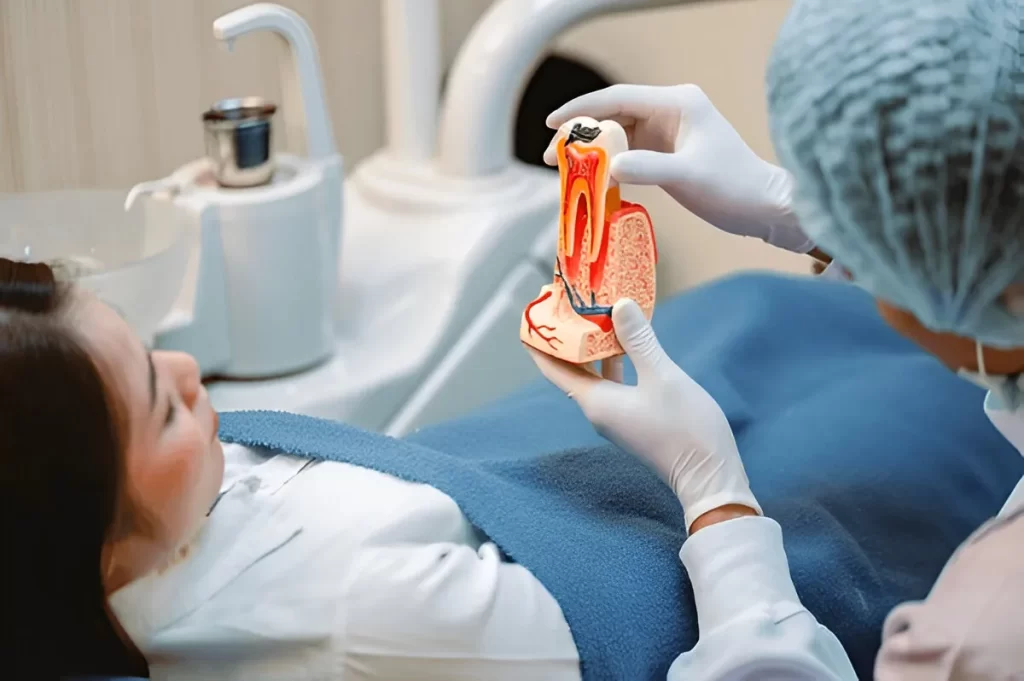Are you looking for expert root canal treatment in Chennai? Our dental clinic offers top-notch endodontic care to restore your smile and alleviate discomfort. Our root canal specialist and experienced team use advanced techniques to ensure a comfortable and effective procedure.
Make an appointment right with the best endodontist in Chennai now to start along the path to perfect oral health with affordable charges for root canal treatment in Chennai. We handle even complex cases with precision to save your natural teeth. From diagnosis to recovery, our focus is on providing effective solutions.
Root canal treatment helps eliminate pain, prevent infection, and protect your teeth for the long term. Trust our clinic for quality root canal treatment in Chennai to improve your oral health. Book now!

Root canal treatment, also known as endodontic therapy, is used to treat infections or damage inside a tooth’s pulp. The pulp, which contains nerves, blood vessels, and connective tissue, can become infected or inflamed due to severe decay, trauma, or other issues.
During the procedure, the dentist or endodontist removes the diseased pulp, then seals, cleanses, and disinfects the tooth to prevent further infection. A crown may be placed for additional strength and protection. Root canal treatment saves the natural tooth, relieves pain, and prevents infection, making it a better alternative to extraction.
Root canal treatment offers the optimal solution for preserving your natural teeth, even in cases of severe decay.
Prevents infection spread
Preserves facial structure
Restores normal tooth function
Relieves severe tooth pain and infection

Minimise tooth loss
Enhances tooth appearance
Improves overall oral health
Maintain the health of the jawbone

A root canal is typically needed when a tooth’s pulp becomes infected or inflamed. This may happen for a number of reasons:
Severe Decay: If tooth decay is left untreated, it can progress deep into the tooth and reach the pulp, leading to infection.
Trauma: Physical trauma to a tooth, such as a crack or fracture, can expose the pulp to bacteria, causing infection or inflammation.
Dental Procedures: Repeated dental procedures on a tooth, such as multiple fillings or restorations, can eventually damage the pulp, necessitating a root canal.
Cracked Tooth Syndrome: Sometimes, a tooth may have a hairline crack that extends into the pulp, causing pain and requiring root canal treatment.
Dental Abscess: A dental abscess, a pus-filled pocket caused by a bacterial infection, can form at the root of a tooth, leading to pulp infection.


HAPPY SMILES

IMPLANTS PLACED

YEARS OF EXPERIENCE

GOOGLE RATINGS
 +91 9600091767
+91 9600091767



Pain perception during a root canal procedure can vary from person to person. However, our best doctor for root canal treatment provides modern techniques and anaesthesia, many people report little to no pain during the procedure itself. Local anaesthesia is administered to numb the tooth and surrounding area, ensuring the patient is comfortable throughout the process.
After the procedure, it’s common to experience some discomfort or mild soreness, but this can usually be managed with over-the-counter pain medication. The pain associated with a root canal is often no worse than a routine dental filling.
Advancements in root canal treatment have significantly improved its success rate and patient experience:
Technology
Modern tools like rotary instruments and electronic apex locators enhance precision and efficiency.
Materials
The use of biocompatible materials like gutta-percha and advanced sealants improves outcomes.

Pain Management
Better anaesthesia techniques and medications minimize discomfort during and after treatment.
Microscope Use
Enhanced visualization through microscopes aids in thorough cleaning and reduces the risk of reinfection.
 +91 9600091767
+91 9600091767

Sendhil Dental is the best choice for root canal treatment in Chennai, offering expert care from highly experienced endodontists. Here’s why you should choose us:
Dental implants offer a long-lasting, natural-looking solution for missing teeth, preserving jawbone health.
Prevent cavities by reducing sugar intake, maintaining good oral hygiene, and getting fluoride treatments.
Typically, you should visit the dentist for check-ups and cleanings every six months to maintain optimal oral health.
Dental X-rays help detect hidden dental issues like cavities, infections, and impacted teeth that may not be visible during a visual exam.
Yes, laser dentistry can be used to treat tooth sensitivity by sealing exposed dentin tubule.
